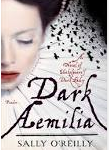 I grant I never saw a goddess go,
I grant I never saw a goddess go,
My mistress when she walks treads on the ground.
And yet by heaven I think my love as rare,
As any she belied with false compare.
The mysteries surrounding the life of William Shakespeare are many, and perhaps none has spawned so many stories as the “Dark Lady” sonnets (127-154) in which Shakespeare describes a love affair. Who was the Dark Lady? Are the sonnets based on life, and if so, whose? One candidate for the role is Emilia Lanier, the daughter of a Jewish Italian musician Baptista Bassano, and wife of a court musician named Alphonse Lanier. Her life story is the basis for Sally O’Reilly’s novel “Dark Aemilia.”
The fictional Aemilia Bassano is the mistress of Henry Carey, Lord Hunsdon, Lord Chamberlain to Queen Elizabeth. She lives, therefore, at the center of court life, though more as an observer than participant. She’s dangerously exposed all the same, especially because she is beautiful and intelligent, and doesn’t always keep her mouth shut. She becomes acquainted with William Shakespeare by letter, as she objects to his characterization of women, and marriage in “The Taming of the Shrew” whose performance she has witnessed. Eventually they meet in person, fall in love, and carry out an affair. It’s very risky for Aemilia, for if she loses the protection of Lord Hunsdon she has no other way to make a living, despite her wish to write.
Lord Hunsdon marries Aemilia off to Alphonse Lanyer. It’s an unhappy marriage, but one that produces a son (though it’s not entirely certain Alphonse is the father). Left to fend for herself through plague, fire, and other calamities, Aemilia both writes and dabbles in alchemy (though for women it’s known by another name). The relationship with Will ebbs and flows; as the sonnet cycle relates, they have a bitter falling out as well as obsessive and frequent sex. Forced to fend for herself through much of her tribulations, Aemilia uses the strengths she has, including her quick wits and her beauty, to keep herself and her son alive.
Doing so requires that she investigate supernatural channels that some call witchcraft, and in fact she meets and communicates with three witches at a fair. This suggests a story to her, one she writes down and that is ‘borrowed’ as the basis for one of Shakespeare’s tragedies. Aemilia is more upset by the intellectual betrayal than she is worried about the chances of being perceived as a witch.
Aemilia’s risk taking, the very strong female characters, and a persuasive portrayal of life in the sixteenth century go far to offset the novel’s weak plot, which depends too much on coincidence and supernatural beings. O’Reilly’s suggestion that Aemilia wrote or suggested MacBeth is interesting but ultimately unpersuasive. “Dark Aemilia” is a book to save for the beach.
Have a book you want me to know about? Email me at asbowie@gmail.com. I also blog about metrics at asbowie.blogspot.com.
